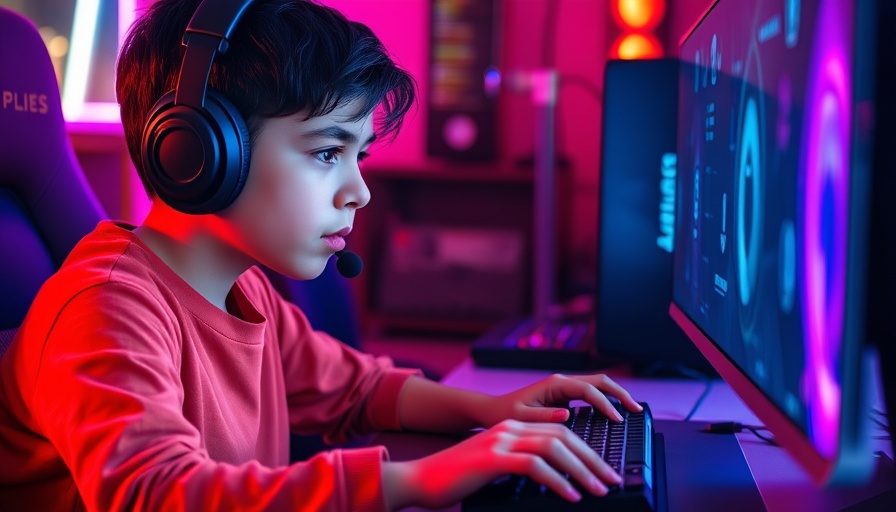
The Hidden Dangers of Online Real-Money Gaming
In today's digital age, the appeal of online gaming has skyrocketed, especially among children and adolescents. However, the introduction of real-money gaming adds a serious twist to this entertainment that can transform it into a dangerous addiction. While gaming once served as a harmless pastime, it now often operates on principles similar to gambling, utilizing psychological hooks designed to keep players engaged at the cost of mental health and familial harmony.
Understanding the Psychological Implications of Gaming Addiction
At the heart of online real-money gaming lies a sophisticated arsenal of engagement tactics: variable rewards, intense competition, and immediate gratification. These elements can ensnare young, impressionable minds, leading not just to excessive time spent online but also to addiction that affects their daily lives profoundly. Parents might notice the signs too late, often when the family is mired in financial strain or when psychological distress becomes evident. It’s disheartening to witness families grappling with consequences such as plummeting academic performance or devastating mental health issues that stem from these gaming experiences.
Boosting Awareness Among Parents: The Importance of Open Conversations
As a parent, cultivating a transparent dialogue with your children about their gaming habits is crucial. Open conversations can help create a safe space where kids feel comfortable sharing their experiences and struggles with online games. Treat these discussions not just as a way to monitor usage, but also as a chance to educate your kids about the potential dangers of addiction.
Sharing stories, whether from personal experiences or anecdotes from others, can make the risks tangible. Consider connecting with local support groups or attending community events focused on mental health awareness. These interactions not only strengthen your understanding of the issues but can also encourage your children to be transparent about their gaming habits with you.
Creating a Balanced Digital Environment: Actionable Tips for Parents
Implementing practical strategies can better regulate your child's gaming experience. Here are some insights to guide you:
- Set Clear Limits: Establish specific times for gaming, integrating device-free periods to encourage other interests.
- Encourage Non-Digital Activities: Offer alternatives that promote quality family time—like board games, crafts, or sports—that engage them beyond the screen.
- Educate Them About Risks: Discuss the psychological traps of online gaming, illustrating how they can deviate from healthy play into addictive behavior.
The Role of Regulation and Support Systems
While parents play a crucial role in guiding their children, regulation and structured support from society are equally essential. Bans on real-money gaming can provide families with the immediate relief they need, reducing the potential for conflict and financial strain. Blocking access to these platforms for young users can delay addiction and empower parents to cultivate healthier gaming habits.
In tandem with bans, robust counseling and prevention programs present opportunities for children struggling with addiction to receive professional help, allowing them to reconnect with healthy habits. Communal efforts towards developing resources and solutions reflect the collective responsibility we all share towards safeguarding the mental health of our youth.
Fostering Resilience: The Benefits of Balanced Play
Encouraging balance in gaming is not about demonizing it but about fostering a healthy relationship with technology. Teaching children to navigate games mindfully can empower them to discern enjoyable experiences from destructive ones. This perspective encourages them not only to engage responsibly with games but also to thrive emotionally and socially in other aspects of life.
Taking Action: What You Can Do Today
As a concerned parent, you have the power to influence your child’s digital interactions positively. Begin today by initiating that vital conversation about their gaming habits. Share your observations about their gaming behaviors, and don't shy away from discussing the potential impacts of excessive play.
Consider organizing game-free weekends where your children can explore new hobbies, meet friends, or participate in family activities. Every conscious effort you make today can contribute to building a healthier digital landscape for future generations.
In conclusion, while the world may revel in the excitement of online real-money gaming, it’s imperative that we remain vigilant about the mental health implications it has on our children. By combining regulations, parental support, and open communication, we can nurture a safer environment where our youth can thrive.
 Add Row
Add Row  Add
Add 




Write A Comment